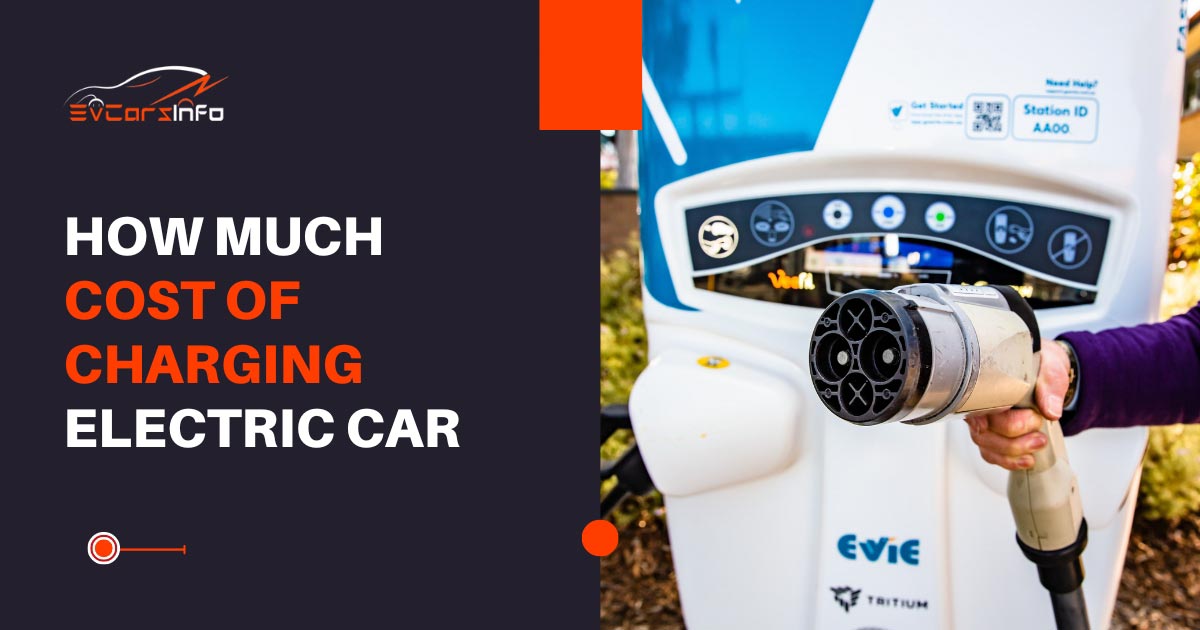

How Much Cost of Charging Electric Car At Home and on A Road Trip
Introduction.
Purchasing an electric car (EV) allows you to avoid costly trips to the gas station while preserving the environment and your health. The learning curve for charging, by how long it would take to Cost of Charging Electric Car, is still present. Let’s dissect your top concerns regarding EV charging even though that you could drive and replenish with assurance.
Costs of Electricity for Charging Electric Car
The most frequent inquiry regarding electric automobiles is: Cost of Charging Electric Car
Kilowatt hours (kWh) every 100 miles are one way to determine how efficient an EV is at using gasoline. The cost of energy (in usd per kWh) as well as the vehicle’s efficiency (how much power is utilized to drive 100 miles) should be known in order to determine the per-mile price of an EV. The per-mile cost is around $0.03 if power is $10.7 per kWh and a car uses 27 kWh to drive 100 miles.
An electric vehicle (EV) with just a 200-mile range and a 54 kWh battery that is entirely discharged will cost around $6 to charge if energy is $10.7 per kilowatt-hour. See the Car Cost Calculator to compare the cost of gasoline for various conventional or electric vehicle types. In comparison to conventional modes of transportation, household power tariffs offer an appealing choice for EV charging due to their predictability and planning advantages.
It is helpful to have a recent power bill on hand for comparison in order to get the most accurate estimate. You should figure out how much you spend on power each month. After that, we’ll provide you some examples to help you calculate how much you pay for each kilowatt hour (kWh) of power utilized. For domestic charging, locate your power statement and subtract the number of kilowatt-hours you consumed from the overall cost. You will then be given the cost per kWh.
Three to four miles per kWh are achieved by electric vehicles. Therefore, multiply the total number of miles you travel monthly by 3 to obtain the monthly kWh usage. Add your price per kWh to that value. The amount you receive will probably be less than what you spend each month on petrol.
Let’s use an illustration to place this in context. Let’s assume that you travel 1,183 miles monthly. Americans drive average of around 14,200 miles annually. You will use around 394 kWh for an EV throughout that period.
Cost of Charging Electric Car on A Road Trip
About $10 and $30 is the typical cost to charge an EV at a public charger since almost empty to practically full. Remember that using a public charger to charge your EV on the go will cost you far more money than charge it at home. However, compared to ICE internal combustion engine automobiles, the cost of gasoline for EVs varies considerably more.
Costs of electricity vary widely. Charger prices for businesses are sometimes twice or treble those for homes. Within the same network, even commercial charging rates might vary by more than 50%. In contrast, there is just a 10% or so difference in petrol costs. Due to the various price structures used by commercial chargers, pricing is frequently not directly comparable. Usually, these prices are a mix of per kWh, each unit of time, and per session. When charging charges are computed based on kWh (the quantity of charge you receive per $1), they might vary significantly.
Time Required to Charge A Electric Car
An electric automobile may be charged in as little to 30 minutes or as long as 12 hours. This is dependent on the battery size and charging station speed.
With a 7kW charging station, it takes an average electric car (60kWh batteries) slightly under 8 hours to get from empty to full. Instead of letting their batteries to charge from empty to full, the majority of drivers choose to top it off. With a 50kW quick charger, you can extend the range of many electric vehicles by a maximum of 100 miles in around 35 minutes. It takes longer to charge your automobile from blank to full the larger the battery as well as the slow the charging station.
The quickest method to charge an electric car is using a rapid charger, which can give it a range of 60 to 200 miles in 20 to 30 minutes. 3.7kW or 7kW is the average power rating for home charging outlets (22kW charge points requires three phase power, that is very rare as well as expensive to install). All electric vehicles can charge at a maximum charge rate they are capable of accept at appropriate charge points with a greater maximum charge rates than they can manage.
Disclaimer:
Electric vehicle charging stations are being installed in more and more companies around the UK. One of the main factors, along with the advantages of sustainability and lower fleet expenses, is employee demand. Since your other charges will often meet the majority of your demands at a lesser cost, rapid charging is rare to be an element of your daily charging routine. For longer trips, access to strategically located quick chargers is essential.
See More:
Federal Tax Credit for Electric Vehicles
How Longer does the EV Battery Last
Rebate For Electric Car in California
10 Best EV Car Under 30k | Top Ten Used Electric Cars Under $30,000
Facebook
Twitter
LinkedIn
Pinterest
Tumblr
Categories
- Abarth (1)
- Acura (1)
- Apple (1)
- Audi (5)
- BMW (3)
- Buick (1)
- Buying Guide (15)
- BYD (2)
- Cadillac (2)
- Car News (41)
- Car Reviews (1)
- Chevrolet (2)
- Citroen (2)
- CUPRA (1)
- EV Basic Info (14)
- Explore EVs (121)
- Fiat (1)
- Fisker (4)
- Ford (3)
- Genesis (3)
- GMC (3)
- Honda (4)
- Huawei (1)
- Hyundai (6)
- Jeep (2)
- Kia (7)
- Lexus (1)
- Lotus (3)
- Lucid Air (2)
- Maintenance Tips (2)
- Maserati (1)
- Mercedes (4)
- Mini (1)
- NIO (4)
- Nissan (2)
- OPEL (1)
- Peugeot (2)
- Polestar (6)
- Porsche (3)
- Ram (1)
- Renault (1)
- Rivian (6)
- Rolls-Royce (1)
- Scout (1)
- Sono (1)
- Subaru (1)
- Tata (1)
- Tesla (6)
- Toyota (3)
- VinFast (5)
- Volkswagen (4)
- Volvo (5)
- Xiaomi (1)
Recent Posts
Related Info
Popular Tags
24 Hour Series
2024 Acura ZDX EV
2024 Chevrolet Silverado EV
2024 Ford F-150 Lightning
2024 Genesis Electrified GV70
2024 GMC Hummer EV Pickup
2024 GMC Hummer EV SUV
2024 Honda Prologue EV
2024 Hyundai Ioniq 6
2024 Kia EV9
2024 Kia Niro EV
2024 Lexus RZ
2024 Nissan Ariya Nismo electric SUV
2024 Polestar 2
2024 Rivian R1S
2024 Rivian R1T
2024 Subaru Solterra EV SUV
2024 Toyota bZ4X
2024 Toyota Mirai
2024 Toyota RAV4 Prime
2024 Volkswagen ID 4
2025 Jeep Wagoneer S
2025 Porsche Taycan
2025 Volvo EX90
Audi Wins 2024 Dakar Rally
BYD Qin L Exposed
Citroen e-C3 2025
Electric Vehicles in Recession
Federal Government Orders recall
GMC Sierra EV Denali Edition 1
Huawei Alpha T5
Hyundai Ioniq 5 2024
kia
Kia Niro
mi su7 price
Music Platform Melon
Porsche Macan EV
Renault 5 E-Tech EV In 2024
Scout Motors EV
Sell Used Electric
Tesla
Tesla Model Y 2024
Tesla Recalls 1.62 M Vehicles
Toyota
Xiaomi SU7
Related posts

January 2, 2024
California Governor Gavin Newsom’s executive order California Electric Car Laws in 2024, which forbade the sale of ICE...

Federal Tax Credit for Electric Vehicles or 2024 EV Tax Credit
OmarBinSofi
December 30, 2023
Contents hide 1 Introduction. 2 Amount of Federal Tax Credit for Electric Vehicles or 2024 EV Tax Credit...

Lithium Batteries: How Long is the Best Life Span of Electric Vehicles?
OmarBinSofi
December 18, 2023
Contents hide 1 Overview 2 The cycle life of Lithium Batteries Overview How long can a set of...

How Many Years Do Electric Vehicle Lead-Acid Batteries Life?
OmarBinSofi
December 16, 2023
How many years do electric vehicle lead-acid batteries last? What causes Lead-Acid Batteries Life to be shortened? The...
EvCarsInfo provides all latest, popular, upcoming, Electric Vehicles News, Reviews and information.We are mainly focused on the Buying Guide, Car News, Car Reviews, Upcoming Cars, ETC.






